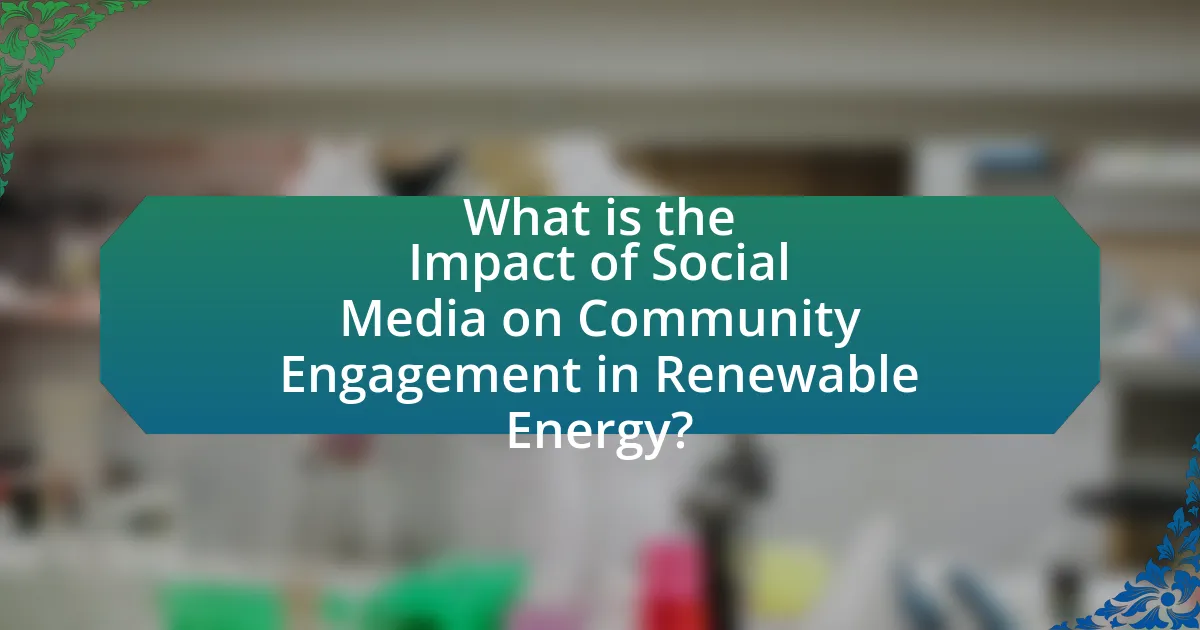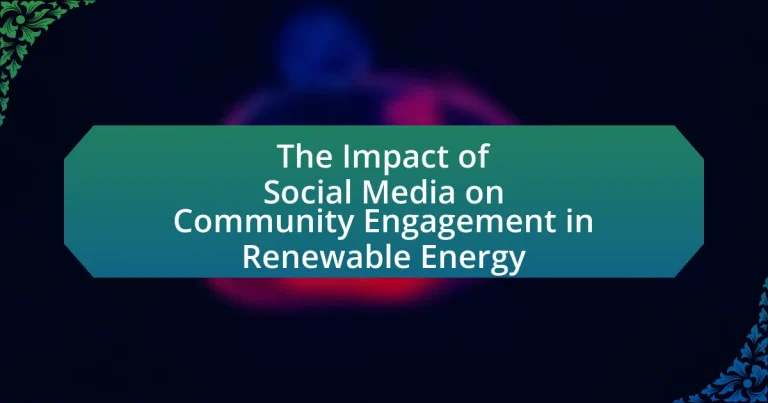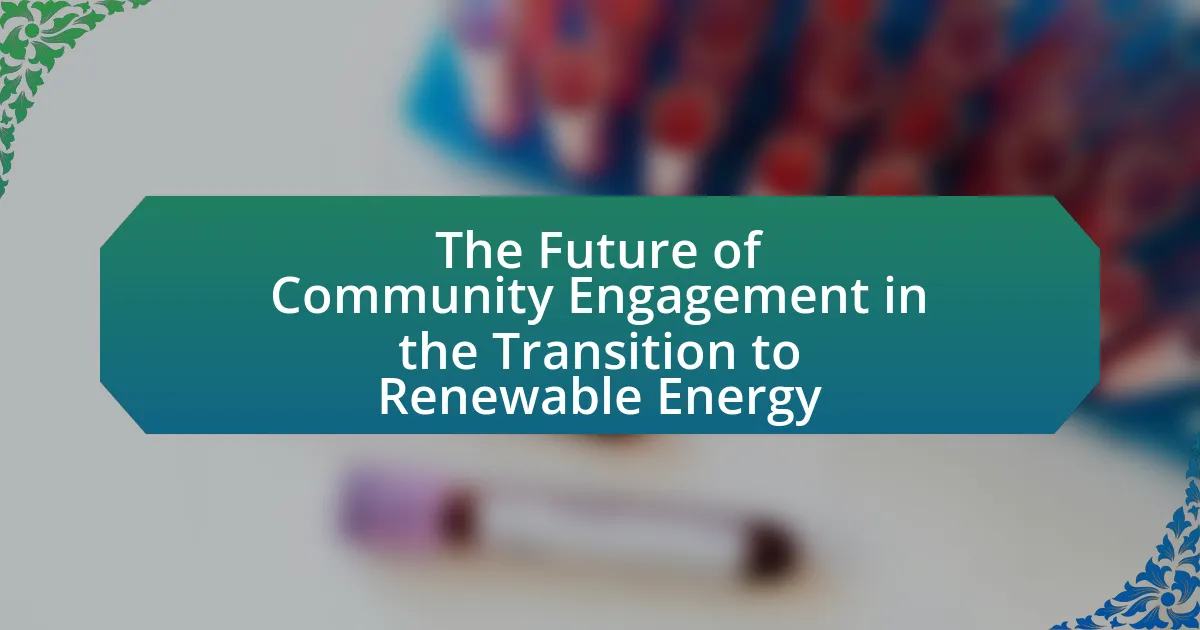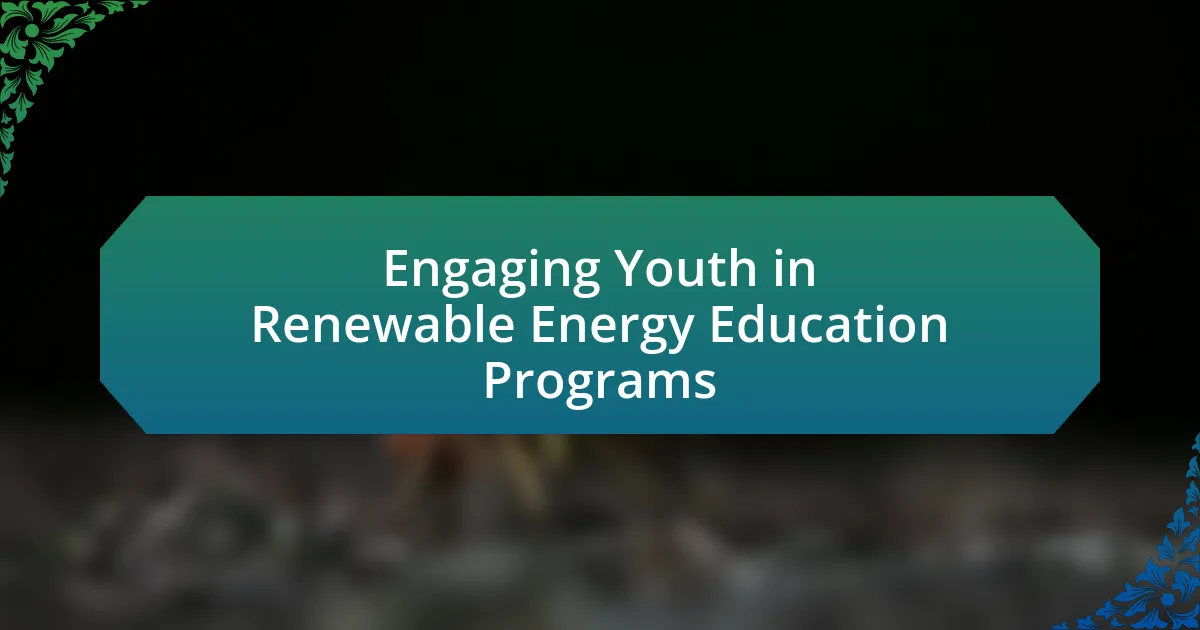The article examines the significant impact of social media on community engagement in renewable energy initiatives. It highlights how platforms such as Facebook, Twitter, and Instagram facilitate information sharing, foster collaboration, and mobilize public support, leading to increased awareness and participation in renewable energy projects. Key findings include the influence of social media on community perceptions, the importance of community engagement for project success, and the challenges posed by misinformation and skepticism. Additionally, the article discusses effective strategies for utilizing social media to enhance engagement and the potential future trends in this domain.

What is the Impact of Social Media on Community Engagement in Renewable Energy?
Social media significantly enhances community engagement in renewable energy by facilitating information sharing, fostering collaboration, and mobilizing public support. Platforms like Facebook, Twitter, and Instagram allow individuals and organizations to disseminate knowledge about renewable energy initiatives, share success stories, and promote local projects. For instance, a study by the International Renewable Energy Agency (IRENA) found that social media campaigns can increase public awareness and participation in renewable energy projects by up to 30%. Additionally, social media enables communities to connect with stakeholders, including policymakers and industry leaders, thereby amplifying their voices and influencing decision-making processes. This interconnectedness ultimately leads to greater community involvement and investment in sustainable energy solutions.
How does social media influence community perceptions of renewable energy?
Social media significantly influences community perceptions of renewable energy by shaping public discourse and disseminating information rapidly. Platforms like Facebook, Twitter, and Instagram allow users to share experiences, opinions, and educational content about renewable energy, which can enhance awareness and acceptance. For instance, a study by the Pew Research Center found that 72% of adults in the U.S. use social media, making it a powerful tool for influencing attitudes toward environmental issues, including renewable energy. Additionally, social media campaigns can mobilize community support for renewable projects, as seen in initiatives that promote solar energy adoption, leading to increased local engagement and advocacy.
What role do social media platforms play in shaping public opinion on renewable energy?
Social media platforms significantly influence public opinion on renewable energy by facilitating information dissemination and community engagement. These platforms enable users to share content related to renewable energy, such as articles, videos, and personal experiences, which can shape perceptions and attitudes. For instance, a study by the Pew Research Center found that 72% of adults in the U.S. use social media, making it a powerful tool for spreading awareness and fostering discussions about renewable energy initiatives. Additionally, social media campaigns can mobilize public support for renewable energy policies, as seen in movements like the global climate strikes, which gained traction through platforms like Twitter and Instagram. This demonstrates that social media not only informs but also actively engages communities in the renewable energy discourse.
How do community members engage with renewable energy content on social media?
Community members engage with renewable energy content on social media primarily through sharing, commenting, and participating in discussions. This engagement often includes sharing articles, infographics, and videos related to renewable energy, which helps to spread awareness and educate others. According to a study by the Pew Research Center, 69% of adults in the U.S. use social media, and platforms like Facebook and Twitter serve as key channels for discussions about environmental issues, including renewable energy. Additionally, community members frequently participate in online groups and forums dedicated to renewable energy topics, fostering a sense of community and collaboration.
Why is community engagement important for renewable energy initiatives?
Community engagement is crucial for renewable energy initiatives because it fosters local support, enhances project acceptance, and ensures that the needs and concerns of the community are addressed. Engaged communities are more likely to participate in decision-making processes, leading to projects that align with local values and priorities. Research indicates that projects with strong community involvement experience a 20% higher success rate in implementation compared to those without such engagement. This is supported by a study from the National Renewable Energy Laboratory, which found that community-driven initiatives often result in increased trust and collaboration between stakeholders, ultimately facilitating smoother project development and operation.
What are the benefits of increased community engagement in renewable energy projects?
Increased community engagement in renewable energy projects leads to enhanced project acceptance and support. When communities are actively involved, they are more likely to understand the benefits and implications of renewable energy initiatives, resulting in higher levels of trust and cooperation. Research indicates that projects with strong community involvement experience a 20-30% increase in local support, as seen in studies conducted by the National Renewable Energy Laboratory. Furthermore, engaged communities can provide valuable local knowledge and insights, which can improve project design and implementation, ultimately leading to more successful outcomes.
How does community support affect the success of renewable energy initiatives?
Community support significantly enhances the success of renewable energy initiatives by fostering local engagement and acceptance. When communities actively participate in the planning and implementation of renewable projects, they are more likely to embrace and support these initiatives, leading to higher adoption rates. For instance, a study by the National Renewable Energy Laboratory found that projects with strong community backing experienced a 50% increase in successful implementation compared to those without local support. This correlation underscores the importance of community involvement in overcoming resistance and ensuring the sustainability of renewable energy efforts.
What challenges do social media platforms face in promoting renewable energy engagement?
Social media platforms face significant challenges in promoting renewable energy engagement, primarily due to misinformation and user skepticism. Misinformation can spread rapidly on these platforms, leading to confusion about renewable energy technologies and their benefits. For instance, a study by the Pew Research Center found that 64% of Americans believe misinformation about climate change is a major problem, which directly impacts public perception of renewable energy initiatives. Additionally, user skepticism arises from a lack of trust in the sources of information shared on social media, as many users question the credibility of posts related to renewable energy. This skepticism can hinder effective engagement and participation in renewable energy discussions and initiatives.
How do misinformation and skepticism impact community engagement on social media?
Misinformation and skepticism significantly reduce community engagement on social media by fostering distrust and confusion among users. When individuals encounter false information, they may become hesitant to participate in discussions or share content, fearing the spread of inaccuracies. A study by the Pew Research Center found that 64% of Americans believe that misinformation has a major impact on their ability to engage with others online. This skepticism can lead to disengagement, as users may withdraw from conversations or avoid platforms where they perceive misinformation is prevalent. Consequently, the overall effectiveness of social media as a tool for community engagement in renewable energy initiatives is diminished, as accurate information is crucial for informed discussions and collective action.
What strategies can be employed to overcome these challenges?
To overcome challenges in community engagement in renewable energy through social media, strategies such as targeted messaging, collaboration with local influencers, and interactive content can be employed. Targeted messaging ensures that information resonates with specific community demographics, increasing relevance and engagement. Collaborating with local influencers can amplify outreach, as these individuals often have established trust within their communities, making them effective advocates for renewable energy initiatives. Additionally, creating interactive content, such as polls, quizzes, and live Q&A sessions, fosters active participation and encourages dialogue, which can enhance community involvement and awareness. These strategies are supported by studies indicating that personalized communication and community-driven initiatives significantly improve engagement rates in social media campaigns related to renewable energy.
How can social media campaigns effectively promote renewable energy initiatives?
Social media campaigns can effectively promote renewable energy initiatives by leveraging targeted messaging and community engagement strategies. These campaigns utilize platforms like Facebook, Twitter, and Instagram to disseminate information about renewable energy benefits, share success stories, and mobilize community action. For instance, a study by the International Renewable Energy Agency found that social media can increase public awareness and support for renewable energy projects by 30% when engaging content is shared. Additionally, interactive elements such as polls, live Q&A sessions, and user-generated content foster a sense of community and encourage participation, further amplifying the reach and impact of the initiatives.
What types of content resonate most with communities regarding renewable energy?
Informative and educational content resonates most with communities regarding renewable energy. This includes articles, videos, and infographics that explain renewable energy technologies, their benefits, and practical applications. Research indicates that communities are particularly engaged by content that highlights local renewable energy projects, success stories, and case studies, as these provide relatable examples and inspire action. For instance, a study by the National Renewable Energy Laboratory found that community-based renewable energy initiatives significantly increase public interest and participation when they are presented through storytelling and local context.
How can influencers and community leaders enhance engagement through social media?
Influencers and community leaders can enhance engagement through social media by creating authentic content that resonates with their audience. This approach fosters trust and encourages interaction, as studies show that 79% of consumers prefer to engage with brands that reflect their values. By utilizing storytelling techniques and sharing personal experiences related to renewable energy, these leaders can inspire their followers to participate in discussions and initiatives. Additionally, leveraging interactive features such as polls, Q&A sessions, and live streams can significantly boost engagement rates, as these methods invite direct participation and feedback from the community.
What are the best practices for utilizing social media in renewable energy community engagement?
The best practices for utilizing social media in renewable energy community engagement include creating informative content, fostering two-way communication, and leveraging local influencers. Informative content, such as infographics and videos about renewable energy benefits, can educate the community and increase awareness. Two-way communication encourages community feedback and participation, which can be facilitated through polls and Q&A sessions. Leveraging local influencers helps to amplify messages and reach a broader audience, as studies show that community members are more likely to engage with content shared by trusted local figures. These practices enhance community involvement and support for renewable energy initiatives.
How can organizations measure the effectiveness of their social media engagement strategies?
Organizations can measure the effectiveness of their social media engagement strategies by analyzing key performance indicators (KPIs) such as engagement rates, reach, and conversion metrics. Engagement rates, which include likes, shares, comments, and overall interactions, provide insight into how well content resonates with the audience. Reach indicates the number of unique users who see the content, helping organizations understand their visibility. Conversion metrics, such as click-through rates and lead generation, reveal how social media efforts translate into tangible actions, like signing up for newsletters or participating in community initiatives. According to a report by Sprout Social, brands that actively track these metrics can improve their engagement strategies by up to 30%, demonstrating the importance of data-driven decision-making in social media management.
What tools and resources are available for optimizing social media campaigns in renewable energy?
Tools and resources available for optimizing social media campaigns in renewable energy include analytics platforms, content management systems, and social media management tools. Analytics platforms like Google Analytics and Hootsuite Insights provide data on audience engagement and campaign performance, enabling targeted adjustments. Content management systems such as WordPress facilitate the creation and scheduling of relevant content tailored to the renewable energy sector. Social media management tools like Buffer and Sprout Social streamline posting, monitoring, and engagement across multiple platforms, enhancing overall campaign effectiveness. These tools collectively support data-driven decision-making and community engagement in renewable energy initiatives.
What future trends can we expect in social media and community engagement for renewable energy?
Future trends in social media and community engagement for renewable energy will increasingly focus on interactive platforms and user-generated content. As renewable energy becomes more mainstream, social media will serve as a vital tool for educating communities, sharing success stories, and mobilizing grassroots movements. For instance, platforms like Instagram and TikTok are already being utilized to showcase renewable energy projects, making complex information more accessible and engaging. Additionally, the rise of virtual reality (VR) and augmented reality (AR) technologies will enhance community engagement by allowing users to visualize renewable energy installations in their local environments. According to a report by the International Renewable Energy Agency (IRENA), social media campaigns have significantly increased public awareness and support for renewable energy initiatives, demonstrating the effectiveness of these platforms in fostering community involvement.
How might emerging technologies influence social media’s role in renewable energy engagement?
Emerging technologies significantly enhance social media’s role in renewable energy engagement by facilitating real-time communication and data sharing. For instance, advancements in artificial intelligence and machine learning enable personalized content delivery, allowing users to receive tailored information about renewable energy initiatives that resonate with their interests. Additionally, augmented reality (AR) and virtual reality (VR) technologies can create immersive experiences, helping users visualize the impact of renewable energy projects in their communities. According to a report by the International Renewable Energy Agency, social media platforms have become vital tools for raising awareness and fostering community participation in renewable energy initiatives, with over 70% of users engaging with content related to sustainability and clean energy solutions. This integration of emerging technologies not only amplifies outreach efforts but also encourages collaborative discussions among stakeholders, ultimately driving greater community involvement in renewable energy efforts.
What potential shifts in community behavior should we anticipate in response to social media trends?
Communities are likely to shift towards increased collaboration and activism in response to social media trends. This shift is driven by the ability of social media platforms to facilitate information sharing and mobilization around renewable energy initiatives. For instance, studies show that social media campaigns can significantly enhance community awareness and participation in local renewable energy projects, as evidenced by the rise in grassroots movements advocating for sustainable practices. Additionally, the use of social media for organizing events and discussions has been linked to higher engagement levels, with a 2021 survey indicating that 70% of participants felt more connected to their community through online platforms. These trends suggest that social media will continue to play a crucial role in shaping community behaviors towards more proactive involvement in renewable energy efforts.




